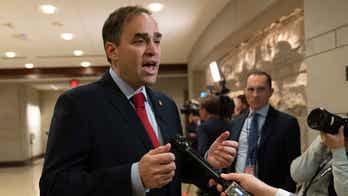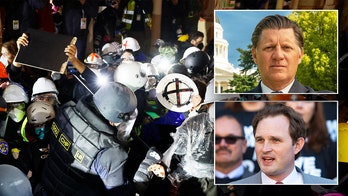Before a national gathering of Latino leaders Thursday, Mitt Romney said that as President, he would give undocumented immigrants brought to the United States as minors the chance to stay in the country permanently --and an eventual path to U.S. citizenship-- but only if they serve in the U.S. military.
Romney, the expected Republican presidential nominee, made his statement at the National Association of Latino Elected and Appointed Officials (NALEO) conference in Orlando.
His announcement came less than a week after President Obama said he was going to give a two-year reprieve to undocumented immigrants who were brought to the country as minors before the age of 16 years old, as long as they met other criteria, including those currently in school or have graduated from high school as well as serving in the military.
“We...have a strong tradition in this country of honoring immigrants who join the military,” Romney said.
As president I will stand for a path [to legalization] for anyone who is willing to defend this great nation through military service
He said 75,000 immigrants in the military have become naturalized U.S. citizens since the 2001 terrorist attacks.
“As president I will stand for a path (to legalization) for anyone who is willing to defend this great nation through military service,” he said.
Those willing to serve “have earned their right to make their life in America,” Romney said.
Obama’s announcement on June 15 was quickly condemned by Republicans. Romney cast Obama’s move to give so-called DREAMers a reprieve as a cynical attempt to romance Latino voters. He began his speech at the NALEO gathering by saying that Obama, who is scheduled to address the group on Friday, takes the Latino vote for granted.
“Unfortunately, despite his promises, President Obama has failed to address immigration reform,” he said. “For two years this president had huge majorities in the House and Senate. . .After three and a half years of putting every issue. . .before immigration, now the President is being seized by an overwhelming need to do what he should have done [from] Day One.”
Romney said he has been asked if, as President, he would overturn Obama’s order to suspend the deportations. Without saying outright what he would do, Romney said “will put in place my own long-term solution that will replace and supercede” the Obama administration’s plan.
“As President, I won’t settle [for temporary solutions],” he said.
Romney's campaign has generally avoided delving into the topic of immigration -- specifically, what to do with the estimated 11 million undocumented immigrants who live in the United States. But with the intense focus on immigration in the last week --because of Obama's deportation announcement and the imminent Supreme Court decision on Arizona's immigration law-- many said the Romney campaign would feel pressured to acknowledge a topic they have treated as almost toxic.
During the GOP primary, Romney often took hard-line stances on immigration, and vowed to veto the DREAM Act –a measure that would give such immigrants a path to legalization as long they meet a strict set of criteria, including graduating from a U.S. high school, going to college or serving in the military, and staying out of trouble with police.
Obama campaign officials shot back at Romney's comments.
“Today, Mitt Romney told the largest national gathering of Hispanic elected officials: ‘When I make a promise to you - I will keep it,'" said Gabriela Domenzain, director of Hispanic Press for the Obama campaign. "But in front of an audience of Republican primary voters, he called the DREAM Act a ‘handout’ and promised to veto it."
"Now, after seven days of refusing to say whether or not he’d repeal the Obama administration’s immigration action that prevents young people who were brought here through no fault of their own as children from being deported, we should take him at his word that he will veto the DREAM Act as president.”
Previous to the NALEO address, Romney had portrayed himself as unyielding on immigration. He included in his campaign circle such high-profile immigration hard-liners as Kris Kobach, Kansas Secretary of State and author of Arizona's controversial anti-illegal immigration law, which is before the U.S. Supreme Court. Kobach has been a key proponent of immigration programs that would make undocumented immigrants so miserable that they would opt to "self-deport," a view that Romney also voiced during the primary.
Romney also made former Gov. Pete Wilson --a Republican from California who made headlines in the 1990's with his hard-line views on illegal immigration-- an official of his campaign staff in that state.
But once Romney essentially secured the GOP nominee spot --which would be made official in the Republican convention in Florida in August-- he seemed to avoid the topic. So much so, that this has made for awkward moments for him.
In a press conference call in recent weeks to announce a Hispanic voter outreach campaign for Romney, Republican National Committee officials grew exasperated over reporter questions about immigration. They clearly said they preferred to focus on the economy, which they stressed was of greater concern to Latino voters than immigration.
And polls of Latino voter sentiments do support that. Respondents have said in polls, including one by Fox News Latino, that immigration trailed other issues, such as the economy and healthcare, on their list of concerns. But likely Latino voters also have showed that a candidate's rhetoric on immigration can alienate them if it comes across as hostile or insensitive to Latinos.
Between 800,000 and 1.4 million undocumented immigrants were brought as minors illegally, or with legal visas that then expired, making their presence here unlawful. Proponents of giving them a path to legalization have argued that they should not be penalized for the decisions of their parents to be here illegally, and that many of them would be assets to the country.
Opponents of giving them a path to legalization say that any reprieve would be tantamount to “amnesty,” and would essentially reward the decision of their parents to break U.S. immigration laws.
The DREAM Act passed the House in 2010, but failed in the Senate.
Obama often has placed blame on the lack of progress on comprehensive immigration reform -- and on getting the DREAM Act passed -- on Republicans.
But many immigration advocacy groups, and DREAMers, as those who were brought as minors are called, increasingly have pointed a finger of blame at Obama. They said he had not really pushed hard, as he did for healthcare reform, for example.
Obama got roughly 70 percent of the Latino vote in 2008, but his supporters had expressed concern that he had alienated many potential voters with his failure to push harder for comprehensive immigration reform – a centerpiece theme of his courting of Latinos four years ago. Polls showed that Latinos had grown frustrated over his unfulfilled promises, especially when taken together with his administration’s record-level deportations. An average of 400,000 immigrants have been deported annually under Obama's administration.
Romney also laid out his plan for a reformed immigration system that would, among other things, raise caps on visas for highly skilled immigrants, streamline the guest-worker process for agricultural and other seasonal workers, mandatory employment verification system.
“Many country caps—or limits on immigrants from specific countries—are so low, that America is losing some of the best and brightest to our international competitors,” said a press release from his campaign.
“High-skill immigrants start companies, create jobs, and drive innovation at an especially high rate. The United States is also projected to face a shortage of 230,000 science and technology workers by 2018.”
“America should keep the best and the brightest here in the United States,” the statement said. “Every foreign student who obtains an advanced degree in math, science, or engineering at a U.S. university should be granted permanent residency.”
Romney said he would make it easier for people to come legally by, among other things, streamlining the visa program for guest-workers who are employed on farms and by reducing the time that legal immigrants who are not naturalized citizens must wait before bringing in relatives to live here.
Daniela Alulema, of the New York State Youth Leadership Council, which pushes for the DREAM Act, expressed ambivalence over Romney's proposals.
"We welcome Mitt Romney's change of tone on immigration, and his proposal to help reduce the case backlog on family petitions," Alulema said. "However, not providing a solution for the millions of undocumented immigrants who considered the United States their home is unacceptable."
She said that "undocumented youth. . .are Americans in everything but paper."
"The DREAM Act is a first step towards legalizing undocumented immigrants, who are the backbone of the American economy and society."
In his NALEO address, Romney did not leave aside his preferred topic -- the economy. He told the audience that Hispanics had been especially hard hit under what he described as Obama's failed economic policies.
Romney's speech drew praise from Rep. Ileana Ros-Lehtinen, R-Fla.
“The Hispanic community has been especially hurt by President Obama’s failed economic policies and hostility to job creators," she said in a statement. "Governor Romney is that leader for us and he will stop this administration’s attack on our country’s job creators. I applaud Governor Romney's efforts to ensure our country enjoys economic growth and prosperity in its future.”
Critics balked, calling Romney's immigration proposals insufficient.
"At his NALEO speech, Mitt Romney fell short," said Ali Noorani, Executive Director of the National Immigration Forum Action Fund. "American voters want — and the Republican Party needs — visionary plans to fix the immigration system, not tweaks around the margin where the only path to legal status for grandmothers is to enlist in the military."
"For the leader of the Republican Party to ignore his Senate colleagues’ obstructions to the DREAM Act in 2010 is revisionist history.”
Follow Elizabeth Llorente on Twitter: @Liz_Llorente
Elizabeth Llorente can be reached elizabeth.llorente@foxnewslatino.com
Follow us on twitter.com/foxnewslatino
Like us at facebook.com/foxnewslatino





